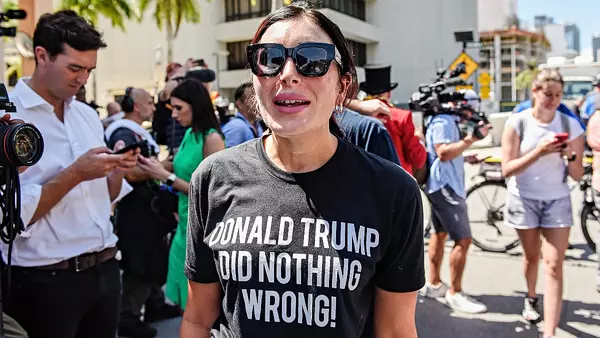
In 2017, the British character actor Daniel Mays was nominated for a Bafta. His one-episode turn in the police procedural Line of Duty, described as “visceral”, “outstanding” and “stomach-clenchingly tense”, had impressed his peers. The nomination was a turning point in his career, but it was also a bust: he didn’t win and he was so nervous during the award ceremony that he couldn’t enjoy the evening. “You’re sort of anxious that if they say your name you’ve got to get up in front of the great and good of your entire industry and be coherent.” After the ceremony, a party kicked off in someone’s hotel room. “Adeel Akhtar was there,” Mays recalls. “Anna Friel was in the room.” Feeling a vibe, he left to buy cigarettes and got stuck in a goods lift. By the time he re-emerged, everyone had disappeared. “It was not the way I’d wanted the evening to pan out.” He tuts. “I may have had something to drink.”
Mays is talking over lunch at an almost empty members’ club in central London, in the wake of being nominated for another award, the Olivier, following a year-long stint in a very popular production of Guys & Dolls, at the Bridge Theatre. The nomination has him reliving concerns about getting up on stage: What does he say? How long should he talk for? That second question was answered at a lunch put on for nominees. “They said, ‘Listen, if you win, you’ve got 40 seconds – that’s it. And if you go over 40 seconds, we’ll play you off with the band.’” He winces at the thought of his waffling being slowly drowned out by music, then relaxes slightly. “I recognise now that just being nominated – I know this is a thing people say – is an amazing achievement. I’m just going to try to enjoy it.”
The Olivier winners were announced on 14 April, after our meeting. Mays didn’t win. But a nomination, for Best Actor in a Musical, is a sign of his versatility as a performer: he can act, he can sing. Mays is three decades into an excellent, unflashy career that has included film, television and theatre roles, and there are plenty of former colleagues willing to say complimentary things. When I asked Chris Foggin, who directed Mays in Fisherman’s Friends, what the actor was like, he replied, “Danny is AMAZING. I loved every second of working with him” – sentiments shared by others.
Before the press night of Guys & Dolls, the musical’s director, Nicholas Hytner, informed cast members that the evening’s usual audience of theatre critics had been replaced by friends and family. When Mays reached the stage, he noticed the auditorium had filled with erstwhile collaborators: Lesley Manville, Keeley Hawes, Jonathan Bryce, Imelda Staunton. (“We all came out,” Eddie Marsan told me over the phone, “because we love him.”) Mays was elated. “That was pretty much the best night I’ve had in theatre,” he says. He later returned home, to northeast London – where he lives with his wife, the makeup artist Louise Burton and their two children – on the tube. Rehearsals had been long and unforgiving, but now: “I knew we were on to something.” Audience members said so in the bar after the performance. “People would come up and say it was the greatest show they’ve ever seen. I’d be like, ‘Wow’” – he puts on a disbelieving tone – “and they’d be like, ‘No, really.’”
Mays said yes to Guys & Dolls while in Paris filming Franklin, an Apple TV+ show that is screening now. The two productions showcase a variety of roles Mays enjoys. In Guys & Dolls he played Nathan Detroit, a character made famous by Frank Sinatra and reprised by Bob Hoskins in a popular 1982 revival at the National. In Franklin, he plays Edward Bancroft, a confidant of Benjamin Franklin who lives a double life as a British spy. Bancroft is a chemist, an entrepreneur and, at least in this retelling, a statesman who enjoys debauchery. “The line in the biography I read about him was, ‘Never had such a sly fox been given such a great view of the hen house.’” Bancroft both adores Franklin and works against him. “This espionage, it’s interesting to me, the moral dilemma. He knows what he’s doing, that it comes at personal cost…”
Though he has appeared in comedies, many of Mays’ characters, like Bancroft, are angry or dissatisfied or unscrupulous men, somehow ill at ease. That his characters must face some form of jeopardy seems a given and, as a result, watching him can be fun or nerve-racking or both at once. (The actor Peter Wright once told him, “Nobody does sweaty panic like you, Danny.”) Often in Mays’ roles, all is not as it first seems. In Line of Duty, Mays played Danny Waldron, another double-crosser, this time a policeman, as a “barbaric loose cannon”, behind which was “this wounded, damaged, frightened young boy”. Mays describes Line of Duty as one of his greatest achievements. “I was like, ‘Wow, in one hour of drama you can take an audience on that journey?’”
Franklin represents another significant move forward. It is a landmark, big-budget American series that took six months to film, and he appears in it opposite Michael Douglas. “On day one we had this big scene where they have dinner together,” Mays says. “A three-and-a-half page scene with Michael Douglas, and that was day one!” (The scene involves Douglas farting at a dinner table, then lauding the benefits of farting at the dinner table.) The pair were dressed in period costume from the 1700s, including heels that did nothing for the health of their backs. They also wore wigs. (Marsan, who appears in Franklin, tells me: “I’d call him, ‘Cilla.’ Danny had great big ginger hair.”) Mays describes performing opposite Douglas, a bona fide Hollywood A-lister, as shocking and awe-inspiring. “I was like, ‘Shit, oh my God,’” he recalls, of scene one. “I’m looking into the whites of his eyes.” Later he adds, “No disrespect to the people I’ve worked with in the past, but it felt like a step up.”
It was Douglas who convinced Mays to take Guys & Dolls. Hytner had asked him to accept a five-month contract – it was later extended – and “I was worried about signing on for that length of time,” Mays says. It also meant singing, which he hadn’t done, professionally or even before an audience, since drama school. On set in Paris one day, Mays’ co-star Noah Jupe asked what projects he had upcoming. “I was like, ‘What the hell, I’ve just had a Zoom with Nick Hytner about a production of Guys & Dolls.’” Douglas was nearby. “He said, ‘What part?’ I said, ‘Nathan Detroit.’ He said, ‘And you’re doing it?’ I said, ‘Michael, I’m in two minds.’ And he said, ‘Listen man, you’re doing it. It’s the greatest part in the greatest musical.’” Within an hour, word of the gig had reached the crew. “The following day I came on set and they’re playing The Oldest Established and the French crew are singing, ‘Nathan/Nathan Detroit…’” He shrugs. “They decided for me.”
I ask if he ever considered that taking a part in a musical would have been a risk. “Well, theatre in general is always…” He tails off. “When you say yes to a part like this, you’ve got to understand you’re going to be doing it eight times a week. It’s a huge undertaking. So you have to be ready.” For a long time, the only day he wasn’t performing was a Sunday. “And you’ve just got to muster up the energy to do something normal.” He goes on, “What people don’t appreciate is the monotony of it. The travelling back and forth. The routine. It’s tough. Your kids are coming back from college and school and you’re going out to work. It’s not only a commitment for you. It’s a huge commitment for your family.
Mays was born in Buckhurst Hill, Essex, in 1978, the third of four boys. He describes his upbringing as “loud and boisterous and a lot of fun”. It was a home in which he had to shout in order to be heard, “so that you naturally have to become an extrovert”. Asked to describe his younger self, Mays offers “studious but cheeky,” and “always able to get away with things”. He has said previously he enjoyed the feeling of being noticed and of pitching for that attention. At school he might have been considered “the class clown”, he says. Every now and then he would impersonate his teachers, in front of his teachers, and somehow elude punishment.
Mays’ father was and still is an electrician. “I have memories of Dad taking us to Sunday League football in the van and us getting hit on the head by various tools.” His mother worked as a bank cashier and later became her husband’s secretary. It was a working-class home. When Mays told his parents he wanted to pursue acting, his mother took on a second job in a box-making factory to help pay for drama school. He studied first at Italia Conti and later at Rada. No one in Mays’ family had experience in the performing arts. Recalling his mother’s work at the box factory, he says, “It’s amazing to me, to think about that sacrifice.”
At Rada, Mays, who speaks in a lightly cockney accent, worried he was becoming typecast. “Just before I left I called a meeting with Nick Barter, the principal at the time, because I kept getting character parts,” he says. “I played the old man Nestor in Troilus and Cressida, and CSM Rivers in The Accrington Pals. Great, interesting support parts – but they weren’t leads. And I started to panic.” Mays worried agents would see him as a member of the chorus and overlook both his ability and his potential. “Nick said, ‘You’re going to work.’ I said, ‘I am?’ And then he said, ‘You’re going to play young men on the edge.’ And he was absolutely right.”
A year after graduating from Rada, Mays was cast in the Mike Leigh film All or Nothing, alongside Lesley Manville and Timothy Spall. When he wrapped his part, Leigh approached him and whispered into his ear, “See you in the next one.” The next one was Vera Drake, in which Mays played the tailor son of Imelda Staunton’s title character. All or Nothing was acclaimed critically, but was not a huge commercial success. But Vera Drake was. “Commercially, that’s where the door opened,” Mays says. Working with Leigh was an education in depth, research and commitment. Before filming, Leigh prepares his actors for months, a process that is gratifying, but exhausting. The pair’s first one-on-one meeting went on so long that, halfway through, Leigh fell asleep. “I thought, ‘Fucking hell, he’s nodded off!’” Mays recalls, “I was just sitting there watching him sort of snooze for a bit.” Eventually, Leigh came round, apologised, excused himself for a while, and “literally went off for a 10-minute power nap.”
When I ask Mays if he considers Leigh a mentor, he says no. “I owe Mike a huge amount,” he says. “How you play character, how you find truth. From an artistic and a commercial point of view I owe him everything.” But he does consider Imelda Staunton to be one. “I call her Mum on text,” he says. “Or Vera.” When Mays faces a professional conundrum, Staunton’s is the number he’ll call. “What’s great about Imelda is that when she’s in the room, when she’s in the scene, she throws everything at it and she’s completely on point. But she doesn’t take herself too seriously afterwards.” Partway through Vera Drake, Staunton’s character throws an engagement party for her daughter and while rehearsing the scene she unfolded the wings of an on-set table and exclaimed: “I’m so excited I’ve got my flaps out.” Mays chuckles at the memory of a respected CBE joking crudely in the middle of a gruelling, hours-long rehearsal. Then he recalls Leigh being unimpressed. “We just fell about laughing,” he says, “and Mike was like, ‘Out – get out of the room!’”
Recalling the film, which charts the actions of a backstreet abortionist in the 1950s, Mays adds, “To think that there are certain states in America that have made abortion illegal again.” He shakes his head. “You’re going to have all these modern-day fucking Vera Drakes walking around, performing these procedures…”
In both Leigh films, Mays plays working-class men and the fact of his upbringing has been a feature of his career, if not its defining characteristic. Mays has spoken previously of turning down East End roles.
I ask him if he’s ever felt typecast. “I’ve got to be careful what I say,” he says. “I think I’ve tried to move the needle in the sense of the roles I’ve taken on. Some days I’m glass half-full, some days I’m half-empty. But I’ve really tried to move away from…” He pauses for a moment. “Maybe I could have ended up in all of those straight-to-DVD gangster movies. You know, I could have had that career…”
“Those roles were on the table?” I ask.
“Yeah,” he says. “But what was the point of going to Conti’s? What was the point of going to Rada?”
Mays often talks with other working-class actors – Marsan, or his close friend Stephen Graham – about their potential. “Sometimes it’s about testing your own perceptions of what a working-class actor can be. That’s what Eddie has said to me, that it’s about turning down roles you’ve played before.” On the phone, Marsan added, “There’s a choice we can make as working-class actors. You can always fall back on caricature. But people like Danny and myself, we choose not to adhere to that. We find that slightly offensive. We want to be actors. We don’t want to be professional cockneys.”
Still now, Mays is apprehensive about his career, what turns it might take. Maybe it doesn’t matter. When we discuss his future, he talks instead about his family. His son, Mylo, who is 19, is studying filmmaking. His daughter is younger. Mays has enjoyed fatherhood so far. “All of that, that part of the tapestry of life, it makes you a better performer anyway.” His son’s arrival was “a big shock”, he says – Mays and Burton hadn’t been together long – and, at first, he bristled at the upcoming responsibility. “What I didn’t know then is that the most important thing in the world is your family, your kids, your partner. All of this other stuff is great…” He waves his hand around the room. “But a career is never going to keep you warm at night. Do you know what I mean?”
Franklin is available now via Apple TV+
Styling Sam Deaman; grooming by Maria Comparetto using Dior Backstage Foundation, Dior Homme Dermo System and Arkive Headcare; photography assistant James Parker; shot at the Mildmay Club, Newington Green, London







